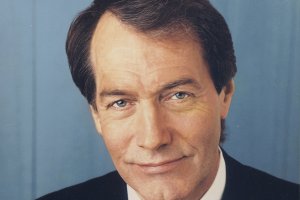Disgraced journalist Charlie Rose’s Hall of Fame biography to include harassment consequences

After deliberation in the wake of disclosures of sexual misconduct by journalist Charlie Rose, a committee of faculty, staff and North Carolina media and journalism industry leaders decided to amend Rose’s NC Media and Journalism Hall of Fame biography to include the professional consequences of the widely-reported behavior.
Universities and institutions nationwide have taken a range of approaches to address honors and distinctions previously conferred upon Rose and other journalists, entertainers and business leaders implicated in a wave of sexual harassment allegations and admissions.
Rose, a Henderson, N.C., native, and Duke University graduate, was inducted into the North Carolina Journalism Hall of Fame in 1999 — 18 years prior to the allegations becoming public. The journalism hall of fame has since been incorporated into the NC Media and Journalism Hall of Fame along with the former halls of fame for leaders in advertising and public relations with ties to the state.
Susan King, a veteran journalist and dean of the UNC Hussman School of Journalism and Media, which administers the NC Media and Journalism Hall of Fame, commented on the committee’s decision on Rose.
“If you are his boss, you fire him. If you are the dean of a media and journalism school, you use it as a learning opportunity,” said King, who spent more than 20 years in Washington, D.C., as an anchor and reporter covering politics. “Transparency is critical to journalistic standards. His fall from grace must be documented along with his career. We have learned that Rose used his power in the profession in a way that is intolerable. Charlie Rose does not stand as a role model. It would be easy to simply remove Rose from the Hall of Fame with indignation. It wouldn’t be enough.”
Dean Susan King’s full statement on Charlie Rose and the NC Media and Journalism Hall of Fame:
What does one do if faced with revelations about workplace aggression from a well-known journalist like Charlie Rose?
If you are his boss, you fire him.
If you are the dean of a media and journalism school, you use it as a learning opportunity, particularly because Rose is a member of the NC Media and Journalism Hall of Fame.
Professionals in all fields may succeed in their public lives while failing personally. My job as dean is to prepare students to understand that and to refuse to tolerate those who would abuse their power. Success is not a license to harass, intimidate or manipulate.
For almost 40 years, NC Hall of Fame committees have identified leaders in the fields of journalism, public relations and advertising. The 1999 Hall of Fame committee recognized Rose’s unique journalistic career and in-depth interviewing style.
As the dean of the school, I don’t control the membership of the Hall of Fame, but I do have a role in its legacy.
As a woman who made her way in a male-dominated industry — and as an educator aware that our school is almost 75 percent female — I find the case of Charlie Rose is not easy. His journalistic style was one I respected.
In the last month, however, women who worked for him have come forward with courage. We have learned that Rose used his power in the profession in a way that is intolerable. Charlie Rose does not stand as a role model.
However, to have him disappear with Kremlin-like efficiency could be to wipe him out of history without making a point. Transparency is critical to journalistic standards. His fall from grace must be documented along with his career. The disgrace and the fact that CBS, PBS and Bloomberg all ended their associations with Rose in light of his reported behavior should be documented.
It would be easy to simply remove Rose from the Hall of Fame with indignation. It wouldn’t be enough.
We must face the question that challenges us all in 2017. Until power in the workplace and in America is equally shared by men and women, there will be inequality and a talent drain.
The issue of sexual aggression in America’s newsrooms, boardrooms and corridors of power will be addressed directly with our students as we enter 2018.